From Gold Medals To Gas Stations: The Untold Story Of Jesse Owens’ Post-Olympic Challenges And Triumphs
Jesse Owens, a renowned athlete from Alabama, made history at the 1936 Berlin Olympic Games by winning four gold medals. Sadly, his remarkable achievements on the track couldn’t make a guarantee for his future prosperity. He endured difficult times, working at a petrol station and racing against amateurs for cash prizes. However, his brilliance and bravery eventually brought him some rewards.
Jesse Owens’ tough childhood
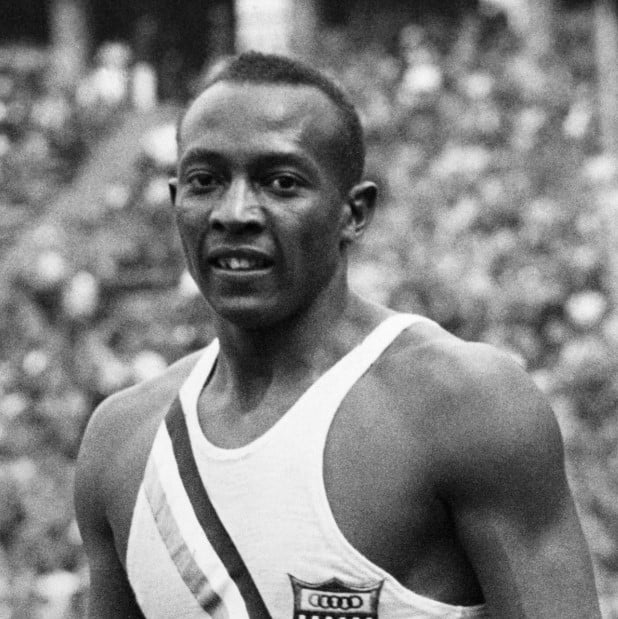
Jesse Owens, known as J.C., was the youngest of ten children in a poor family. At age 9, his family moved to Cleveland, Ohio, seeking better opportunities during the Great Migration, when 1.6 million African Americans left the segregated South for the urban North. When his new teacher asked his name, he said “J.C.,” but she misheard it as “Jesse” due to his Southern accent.
As a youth, Owens worked various menial jobs in his spare time: delivering groceries, loading freight cars, and working in a shoe repair shop. During this time, Owens discovered his passion for running.
His experiences with racial discrimination despite his talent
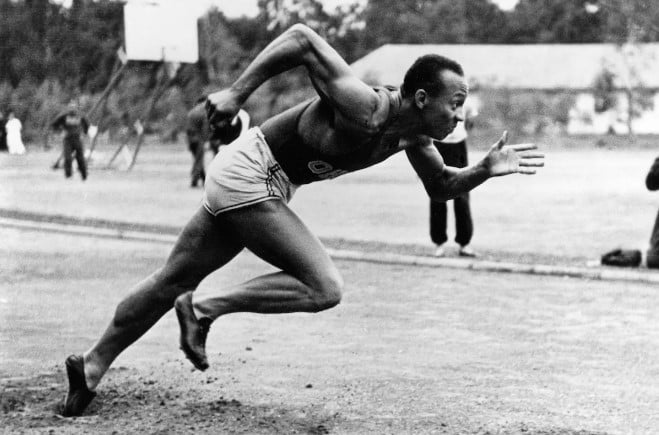
Owens first gained national attention as a student at East Technical High School in Cleveland. He matched the world record of 9.4 seconds in the 100-yard dash and long-jumped 24 feet 9½ inches at the 1933 National High School Championship in Chicago.
After high school, Jesse Owens enrolled at Ohio State University, where he continued to excel in track and field. However, he faced racial discrimination during this time. Owens had to live off-campus with other African-American athletes. When traveling with the team, he could only order carry-out or eat at “blacks-only” restaurants and stay at “blacks-only” hotels. Despite his athletic achievements, Owens did not receive a scholarship and had to work part-time jobs to pay for school.
His achievements at the 1936 Summer Olympics in Berlin
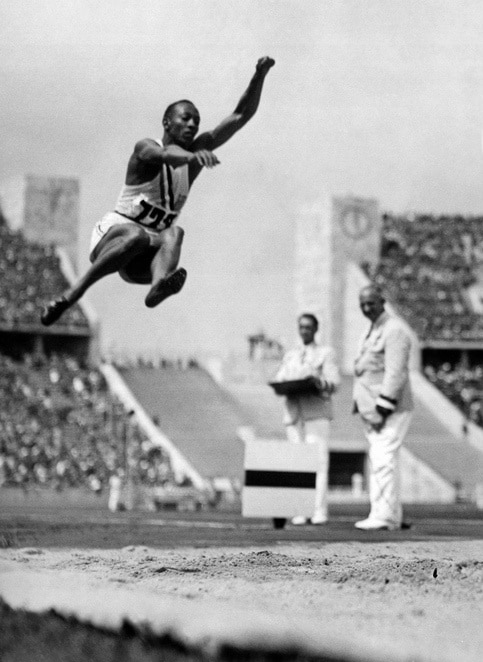
On December 4, 1935, NAACP Secretary Walter Francis White wrote a letter to Jesse Owens, urging him not to participate in the 1936 Summer Olympics in Nazi Germany. White argued that an African American should not support a racist regime, especially given the discrimination faced by Black people in the U.S. At that time, there was a growing movement to boycott the Games.
The NAACP convinced Owens to state, “If there are minorities in Germany who are being discriminated against, the United States should withdraw from the 1936 Olympics”. However, Owens and others decided to compete after Avery Brundage, president of the American Olympic Committee, called them “un-American agitators.”
In 1936, Jesse Owens and his U.S. teammates sailed to Germany on the SS Manhattan to compete in the Berlin Summer Olympics. Fellow sprinter James LuValle, who won bronze in the 400 meters, recalled how Owens was greeted at the Olympic stadium by excited fans, especially young girls shouting, “Wo ist Jesse? Wo ist Jesse?” (“Where is Jesse? Where is Jesse?”).
Before the competitions began, Adi Dassler, the founder of Adidas, visited Owens in the Olympic village. He convinced Owens to wear shoes made by his company, Gebrüder Dassler Schuhfabrik. This marked the first sponsorship for an African American male athlete.
Jesse Owens was the most successful athlete of his time. On August 3, he won the 100m dash in 10.3 seconds. The next day, he took the long jump with a leap of 8.06 meters (26 feet 5 inches), just 3¼ inches short of his own world record. On August 5, he won the 200m sprint in 20.7 seconds, beating his teammate Mack Robinson. Finally, on August 9, Owens secured his fourth gold medal in the 4x100m relay.
The controversy surrounding Hitler’s alleged snub of Owens
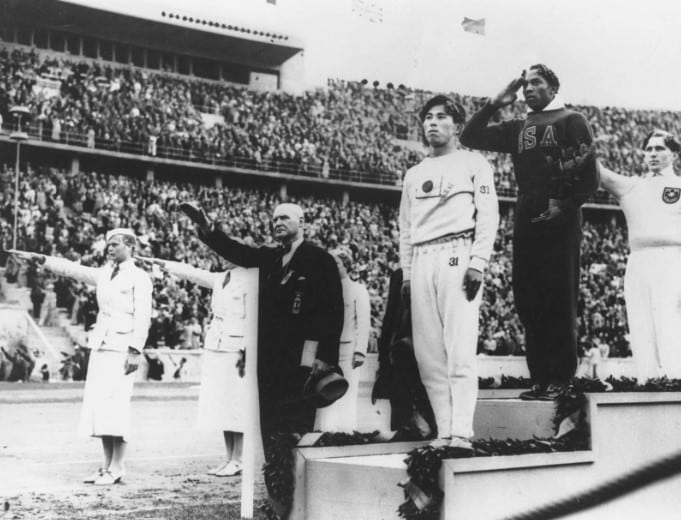
After the Olympics, stories spread that Hitler had “snubbed” Jesse Owens. The common tale is that Hitler left the stadium after Owens won his first medal, not wanting to acknowledge a non-Aryan athlete. Initially, Owens said this wasn’t true but later claimed it was. The story appeared in newspapers worldwide.
It’s true that Hitler did not shake hands with Owens. In fact, he didn’t congratulate any gold medalists after the first day of competition on August 2, 1936. On August 3, when Owens won his first gold medal in the 100-meter dash, Hitler did not meet or shake hands with him. However, some reports mention a salute or wave.
Sports reporter and author Paul Gallico, writing from Berlin, noted that Owens was “led below the honor box, where he smiled and bowed, and Herr Hitler gave him a friendly little Nazi salute, the sitting down one with the arm bent.” Owens himself later confirmed this, claiming that they exchanged congratulatory waves.
His post-Olympic challenges
After winning four gold medals at the 1936 Olympics, Jesse Owens returned home to face racism, which made it hard for him to earn a living despite his fame. He struggled to find work and ended up taking jobs as a gas station attendant, playground janitor, and dry cleaning manager. Sometimes, he even raced against motorbikes, cars, trucks, and horses for cash prizes.
“People say it was degrading for an Olympic champion to run against a horse, but what was I supposed to do? I had four gold medals, but you can’t eat four gold medals.”
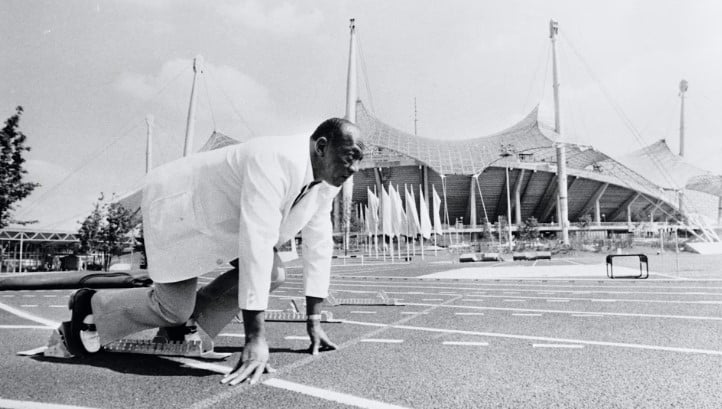
Owens was not allowed to appear at amateur sporting events to raise his profile, and commercial opportunities quickly dried up.
To make a living, he turned to being a sports promoter and entertainer. He would give local sprinters a head start and then beat them in races. He also raced and beat horses, revealing later that he chose high-strung Thoroughbreds that would get spooked by the starter’s gun. Reflecting on the lack of opportunities, Owens said, “There was no television, no big advertising, no endorsements then. Not for a black man, anyway.”
In 1965, Jesse Owens was hired as a running instructor for the New York Mets’ spring training. Despite this, he struggled financially, running a dry cleaning business and working as a gas station attendant, but eventually filed for bankruptcy. In 1966, Owens was prosecuted for tax evasion.
At rock bottom, he began his road to recovery with some help. In 1955, President Dwight D. Eisenhower had already enlisted Owens as a goodwill ambassador, sending him to India, the Philippines, and Malaya to promote physical exercise and American values. Owens continued these goodwill tours throughout the 1960s and 1970s.
A few months before he passed away, Owens tried to persuade President Jimmy Carter to call off the United States’ plan to boycott the 1980 Moscow Olympics. The boycott was in protest of the Soviet invasion of Afghanistan. Owens believed the Olympics should be a break from war and politics.
Even though Carter didn’t change his mind about the boycott, he paid tribute to Owens after his death. He said, “Perhaps no athlete better symbolized the human struggle against tyranny, poverty and racial bigotry.”

